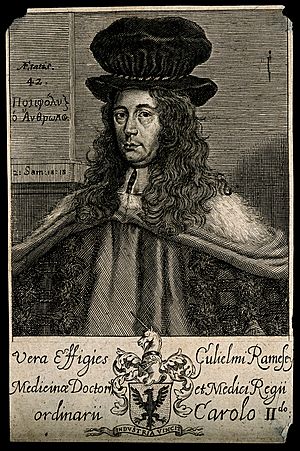William Ramsay (astrologer) facts for kids
Quick facts for kids
William Ramsay
|
|
|---|---|

William Ramesey. Line engraving by W. Sherwin, 1668.
|
|
| Born | 13 March 1626 or 1627 |
| Died | c. 1676 |
| Occupation | Physician, Astrologer |
William Ramsay (born in 1626 or 1627, died around 1676) was a fascinating person from Scotland and England. He was known as a physician (a doctor) and an astrologer. An astrologer is someone who studies the positions of stars and planets, believing they influence events on Earth.
Early Life and Education
William Ramsay was born in Westminster, London, on March 13, 1626 or 1627. His father, David Ramsay, was a skilled clock-maker for two kings, King James I and King Charles I. William's family had Scottish roots, but his mother was English. Interestingly, William spelled his last name "Ramesey" because he believed his family came from ancient Egypt.
William went to several schools around London. He had planned to go to Oxford University, but a big conflict called the English Civil War stopped him. Instead, he went to St. Andrews in Scotland. His studies there were also interrupted by the war. He then moved to Edinburgh, but had to leave because of a serious illness called the plague. Finally, he returned to London in April 1645.
Becoming a Doctor and Astrologer
By the end of 1652, William Ramsay had earned his medical degree (M.D.) from Montpellier University in France. An M.D. means "Doctor of Medicine." After his studies, he lived with his father in an area of London called Holborn. On July 31, he was officially allowed to practice medicine by the London College of Physicians.
Later, William Ramsay became a special doctor for King Charles II. This important role was called "physician-in-ordinary." In June 1668, while living in Plymouth, he received another medical degree from Cambridge University, thanks to a special request from the King. His last known book was published in 1676, and he disappears from historical records after that year.
His Writings
William Ramsay wrote several books during his lifetime. Many of his writings focused on his interests in medicine and astrology. Here are a few examples of his works:
- A reply to a scandalous pamphlet entituled A declaration against judicial astrology (1650): This book was his response to people who criticized astrology.
- Lux veritatis: or, Christian judicial astrology vindicated (1651): Another book where he defended astrology, trying to show it could fit with Christian beliefs.
- Vox stellarum; or, the voice of the starres (1651): This title means "The Voice of the Stars," showing his deep interest in astrology.
- Astrologia restaurate; or astrology restored (1653): In this work, he aimed to bring astrology back to its respected place.
- De venenis; or, a discourse of poisons (1663; 1665): This book was about poisons, showing his medical knowledge.
- Some physical considerations of the matter, origination, and several species of worms (1668): A medical book discussing different types of worms.
- The gentleman's companion: or a character of true nobility (1672): This book explored what it meant to be a truly noble person.
 | Isaac Myers |
 | D. Hamilton Jackson |
 | A. Philip Randolph |

